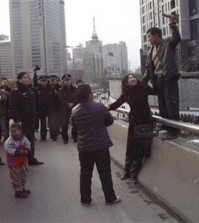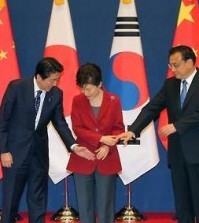- California Assembly OKs highest minimum wage in nation
- S. Korea unveils first graphic cigarette warnings
- US joins with South Korea, Japan in bid to deter North Korea
- LPGA golfer Chun In-gee finally back in action
- S. Korea won’t be top seed in final World Cup qualification round
- US men’s soccer misses 2nd straight Olympics
- US back on track in qualifying with 4-0 win over Guatemala
- High-intensity workout injuries spawn cottage industry
- CDC expands range of Zika mosquitoes into parts of Northeast
- Who knew? ‘The Walking Dead’ is helping families connect
Korean TV inspires Chinese shows

The Chinese version of Korean reality show “Where Are We Going, Dad?” from MBC is drawing the highest viewer rating on cable channel Hunan TV. The Korean television franchises produced by both terrestrial broadcasters and cable networks are scoring big with Chinese viewers. (Courtesy of MBC)
By Chung Ah-young
The Korean Wave or “hallyu” is providing the basis for new television show content, particularly in China.
The Chinese version of Korean reality show “Where Are We Going, Dad?” from MBC is drawing the highest viewer rating on cable channel Hunan TV. The Chinese broadcasting companies have adopted foreign formats in recent years from the United States, the United Kingdom and the Netherlands among others. But the Korean television franchises produced by both terrestrial broadcasters and cable networks ― such as JTBC and Mnet here ― are also scoring big with Chinese viewers.
Even a few years ago, “We Got Married” and “Running Man” were the most popular Korean programs among Chinese-speaking audiences but these were circulated through illegal downloads.
But the recent phenomenon is different in that Korean programs are localized to cater to local viewers’ tastes because awareness about copyright issues has become more serious.
In 2013 alone, five Korean variety shows were adapted for Chinese versions, which turned out to be successful in the overheated competition of the Chinese television industry.

JTBC has exported “Hidden Singer” (above) to Hunan TV, in which a famous singer and impersonators sing behind a curtain and then viewers are asked to vote
on who they think the real McCoy is.
The first Korean reality franchise exported to China was KBS quiz show “Golden Bell Challenge” in 2003. But there wasn’t any really significant success until Hunan TV purchased the rights to remake the Korean popular singing contest “I Am a Singer.”
The Chinese version of “I Am a Singer” aired on China’s Hunan TV became the first program to show the great potential of exporting Korean style-entertainment to China. It has overturned the trend of Chinese variety shows, surpassing the highest rating “Voice of China,” an equivalent to the Dutch singing audition program “Voice of Holland” in 2012.
The first episode of the Chinese version of “I Am a Singer” hit the airwaves on Jan. 18 this year and topped the viewing figures with 2.38 percent. Weibo, China’s blogging service was flooded with more than 100 million messages related to “I Am a Singer” over three months with 200 million hits on related videos on Tencent, China’s largest Internet service portal.
For the successful production of the Chinese version, Korean staff members such as producer Kim Young-hee took part in the creative process, building up a reliable relationship between the two parties.
According to the Korea Creative Content Agency (KOCCA), the demand for the rights to Korean-style reality shows has grown rapidly ever since “I Am a Singer” became a hit.
In fact, since airing the Chinese version of “I Am a Singer,” more Korean entertainment franchises are being sought by broadcasters there. MBC has sold the rights of “Where Are We Going, Dad?” and “Real Men” to Hunan TV while the license for SBS’s “K-pop Star” was purchased by Shandong TV, and KBS’s “1 Night and 2 Days” and “Immortal Song” were sold to Sichuan TV and Shanghai TV, respectively. Mnet’s “Superstar K” was bought by Hubei TV, and JTBC has exported “Hidden Singer” to Hunan TV in which a famous singer and impersonators sing behind a curtain and then viewers are asked to vote on who the real performer is.
Also, Kangta, a former member of H.O.T., has joined the cast of the Chinese version of “1 Night 2 Days.” KBS sold the rights for a Chinese version of the show, which premiered on Sept. 13 through Sichuan satellite TV and internet video network Youku.
The South China Morning Post quoted Zang Zhi, the director of Superstar China, saying that “a number of Korean dramas and entertainment programs have been embraced in China because they don’t conflict with Chinese culture and values.”
“Japan exports a lot of cultural content … but Chinese viewers want sentimentality in their entertainment programs and Japanese programs don’t have that warmth,” it reported.
It also observed that “the trend of importing and remaking entertainment programs from South Korea and other countries is likely to continue as China continues to open up.”
Hunan ― Chinese TV giant
In China, numerous broadcasters and cable networks are vying competitively to acquire licenses for foreign hit television programs. Among others, Hunan TV was quick to purchase “Where Are We Going, Dad?” The Chinese broadcaster is home to a slew of popular entertainment programs such as “Happy Camp,” which was launched in 1997 and instantly attracted a viewership of tens of millions. The show is widely known to Koreans because it features numerous hallyu stars such as K-pop group Super Junior in the show.
The company is leading the market by broadcasting “I Am a Singer” and “Where Are We Going, Dad” back to back, causing Chinese audiences to be glued to the screen. Hunan has purchased the current hit shows “Real Men” and “Hidden Singer.” It is planning to produce season 2 of “I Am a Singer” next year.
Sensation of “Where Are We Going, Dad?”
The Chinese edition of MBC’s “Where Are We Going Dad?” was first aired on Oct. 11 after Hunan TV bought the format from MBC in April. The first episode recorded a viewer rating of 1.46 percent, the highest among the programs on the same slot.
This popularity is notably astonishing considering the popularity of Hunan TV’s most famous audition program, “Happy Boy” in the same time slot with 1.4 percent the previous week. “Chinese people are showing an increasing interest in anything that has to do with children because of the country’s one-child policy. This is why the show is doing well in China,” an MBC official said.
The Chinese version stars top Taiwanese actor Jimmy Lin and his son, director Wang Yue Lun and his daughter, diver-turned-actor Tian Liang and his daughter, model Zhang Liang and his son, and actor Guo Tao and his son.
The show follows a format similar to the Korean original in which Chinese celeb dads spend 72 hours with their children on a trip. During each episode, they are supposed to complete a “mission,” such as cooking and hunting for food. The mission also shows competition between father-child pairs. The show has received more than five million views on the country’s biggest video-sharing website Tudou.
Critics said that it is becoming popular because Chinese celebrities usually don’t reveal details of their private lives and families to the public.

















hppy romz
August 12, 2017 at 1:46 AM
More About the Concept of an Afterlife: The only part of you that could in any way survive into an afterlife would have to be an immaterial part of you since when you snuff it, your material remains go nowhere. But any immaterial part of you would have no sensory apparatus so how could you enjoy an afterlife when you couldn’t experience it? On the other hand, if your life is but a computer simulation, then equally so could your afterlife be another simulation. One software program ends (death) and another begins (afterlife).